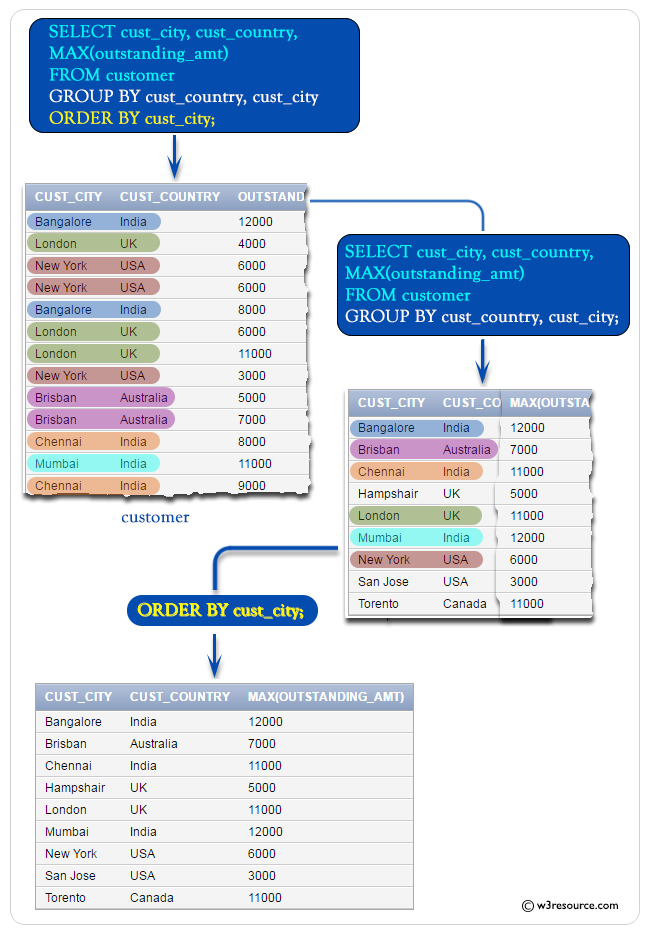
SQL max () with group by and order by. Possible Duplicate: Retrieving the last record in each group I have one table, which has three fields and data. Name , Top , Total cat , , dog , 2. Like many SQL problems, the key to understanding the solution is to rephrase the English question to make it easy to translate into SQL.
The only difference is subqueries are disallowed. How to select first, last, maximum or minimum row for each group , without using a join or a subquery in SQL ? Group by max () without join or inner select. In this post, I am giving you a full demonstration on finding max value for each group of records in MySQL.
Today morning, I was working on one report and requirement is to find max value records for each particular group of data. I know, You guys are thinking that this is a very simple solution using MAX () and GROUP BY clause. However, the result only returns the grouped fields but not all the fields in the original table. Access SQL select MAX record. Mind you that this approach will only get you the top because the aggregate in the subquery only returns a single value per group.
GROUP BY matchnum, and thus there is only one row produced for each matchnum, but since voteswas not included in the GROUP BY (mysql calls this a hidden column), the value chosen for. Auto-suggest helps you quickly narrow down your search by suggesting possible matches as you type. We’ll use the row_number() function partitioned by date in an inner query, and then filter to row_num = in the outer query to get just the first record per group. This function numbers each of the rows: row_number() over (partition by dt order by ct desc) row_num. The Rows Holding the Group-wise Maximum of a Certain Column Task: For each article, find the dealer or dealers with the most expensive price.
Identify each new gps coordinate in time sequence per each car (new_gps). Count how many new_gps you have for each row in specific partition and windows frame (grp_helper). Comparing performance of max (), DISTINCT ON, function, correlated subquery and LATERAL in this: SQL Fiddle. Here the sub-select finds the most recent created_at timestamp per holding (holding_id and holding_type together ensure a unique StockHolding or BondHolding).
For top n per group you can simply use ROW_NUMBER() with a PARTITION clause, and filter against that in the outer query. Dear friends, My table is as show in below… for each ‘grpid’ I want get row with Max tiv value and code should be distinct. Using the SQL GROUP BY clause for counting combinations. How to check SQL query construction with the Mimer Validator. Read about the Mimer Validator, a tool used to verify your SQL code, in this tip from SQL expert Rudy.
I have a problem and have a feeling a simple DAX formula can solve it. Summary: in this tutorial, you will learn how to use SQLite MAX function to get the maximum value of all values in a group. Introduction to SQLite MAX function. The SQLite MAX function is an aggregate function that returns the maximum value of all values in a group.

You can use the MAX function to accomplish a lot of things. The SQL GROUP BY Clause is used to output a row across specified column values. It is typically used in conjunction with aggregate functions such as SUM or Count to summarize values. In SQL groups are unique combinations of fields.
Rather than returning every row in a. In SQL query we can achive this using like GROUP BY Employee MAX (DATE) and COUNT the designation which is related to this EmployeeID and DATE. Let me know if you need any further details. Yes, I do have date table. SQL HOME SQL Intro SQL Syntax SQL Select SQL Select Distinct SQL Where SQL An Or, Not SQL Order By SQL Insert Into SQL Null Values SQL Update SQL Delete SQL Select Top SQL Min and Max SQL Count, Avg, Sum SQL Like SQL Wildcards SQL In SQL Between SQL Aliases SQL Joins SQL Inner Join SQL Left Join SQL Right Join SQL Full Join SQL Self Join SQL Union SQL Group By SQL Having SQL Exists SQL Any.
Since forename and surname are neither grouping coulmn nor aggregate functions, using them in the select clause is not valid.
Keine Kommentare:
Kommentar veröffentlichen
Hinweis: Nur ein Mitglied dieses Blogs kann Kommentare posten.